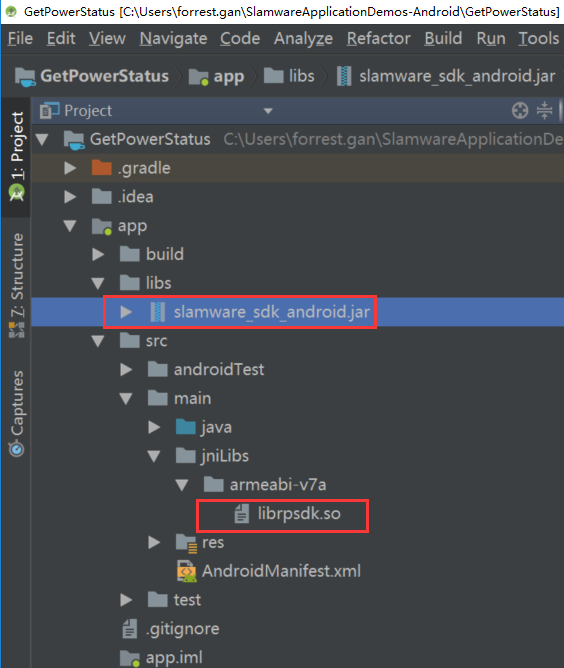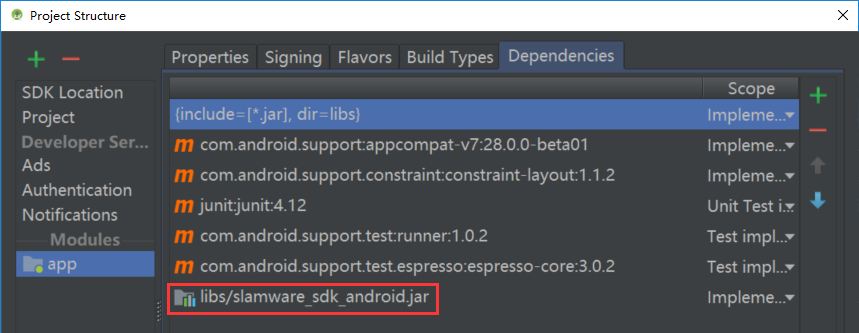在机器人开发过程中可能会出现非正常行为,在沟通的过程中需要反馈一些数据Log,以便思岚进行数据分析。本文将通过GetLogInfo介绍如何使用Android SDK来获取底盘的Log信息,以便分析之用。
本页内容
RoboStudio 插件:peer log / action stack / diagnosis,其中插件的激活码需要申请,由思岚工程师提供
Sample Code: SampleCode.java
Slamware 的固件和SDK在2018年9月14日才添加用户获取Log的功能和接口,如有获取Log的需求,请更新至2018年9月14日的版本。 使用不同版本的Android Studio可能会带来编译异常,请自行下载相关库和修改build.gradle配置文件,本例程基于Slamware Android SDK 2.6.0 进行开发,若想尝试更高的SDK版本,请直接替换工程中的 slamware_sdk_android.jar 和 librpsdk.so 文件。 |
(以下任选其一)

到 Project Structure --> app --> Dependencies 检查Slamware SDK是否添加到工程中。

将以下代码段的"10.0.130.71"修改为底盘的IP地址,默认情况下为192.168.11.1,当WIFI处于Station模式下请将PC与底盘使用Ethenet连接后查看。方法说明:AbstractSlamwarePlatform connect(String host, int port),其中host为底盘IP,port为网络端口号,返回值为底盘的实例对象。
// connect to the robot.
String ip = "10.0.130.71";
int port = 1445;
Log.i("MyCorePlatform", "start to connect.");
com.slamtec.slamware.AbstractSlamwarePlatform corePltfm = com.slamtec.slamware.discovery.DeviceManager.connect(ip, port); |
Android设备连接底盘发射出的WIFI或连入底盘的同一网络,按下shift + F10 运行,可以在AS Logcat中看到通过SDK获取到的Log信息,如下图所示。

本例程仅仅用作最简单SDK类和方法的演示,故没有设计Android界面 |

try {
// connect to the robot.
String ip = "10.0.130.71";
int port = 1445;
Log.i("MyCorePlatform", "start to connect.");
com.slamtec.slamware.AbstractSlamwarePlatform corePltfm = com.slamtec.slamware.discovery.DeviceManager.connect(ip, port);
if (null == corePltfm)
{
Log.e("MyCorePlatform", "Failed to connect.");
return;
}
Log.i("MyCorePlatform", "Connected");
// Create Customer Log Receiver for receiving logs;
// If the connection is lost, the old log receiver will not work, a new one should be created.
com.slamtec.slamware.log.customer.ICustomerLogReceiver logReceiver = corePltfm.createCustomerLogReceiver();
if (null == logReceiver)
{
Log.e("MyLogReceiver", "Failed to create.");
return;
}
Log.i("MyLogReceiver", "Created");
com.slamtec.slamware.log.customer.CustomerLogReceiverInitArg initArg = null;
// if you want to resume the last receive status, load the saved status data like the following codes:
/*
{
initArg = new com.slamtec.slamware.log.customer.CustomerLogReceiverInitArg();
initArg.setLastRecvStatus(lastRecvStatus); // lastRecvStatus is the last receive status data you saved before
}
*/
com.slamtec.slamware.log.customer.ResultCode resCode = logReceiver.init(initArg);
if (com.slamtec.slamware.log.customer.ResultCode.Ok != resCode)
{
Log.e("MyLogReceiver", "Failed to init, resCode: " + resCode.name());
return;
}
boolean isWorking = true;
while (isWorking)
{
// some other operations of your application
int maxCntToRead = 0; // set to zero to use the default value of the robot.
com.slamtec.slamware.utils.StdPair<com.slamtec.slamware.log.customer.ResultCode, com.slamtec.slamware.log.customer.ReadResult> pairRes
= logReceiver.recvLogs(maxCntToRead);
if (com.slamtec.slamware.log.customer.ResultCode.Ok == pairRes.getFirst())
{
showMyLogsResult_(pairRes.getSecond());
}
else
{
Log.e("MyLogs", ("ResultCode: " + pairRes.getFirst().name()));
}
// some other operations of your application
Thread.sleep(100);
}
// you may save it for the next time to continue to receive logs if you want.
/*
{
com.slamtec.slamware.log.customer.CustomerLogReceiverLastRecvStatus lastRecvStatus = logReceiver.getLastRecvStatus();
// now you can save lastRecvStatus somewhere for the next time
}
*/
}
catch (Exception e) {
Log.e("MyException", e.toString());
} |
private void showMyLogsResult_(com.slamtec.slamware.log.customer.ReadResult tRes) {
java.util.ArrayList<com.slamtec.slamware.log.LogData> logsList = tRes.getLogs();
int iLogsCnt = (null != logsList ? logsList.size() : 0);
Log.i("MyLogs", ("LogsCnt: " + iLogsCnt));
if (iLogsCnt < 1)
return;
for (int i = 0; i < iLogsCnt; ++i)
{
Log.i("MyLogs", ("logs[" + i + "]"));
com.slamtec.slamware.log.LogData logDat = logsList.get(i);
if (null == logDat)
{
// it should not be null here, there may be some problems.
Log.e("MyLogs", "null log data.");
continue;
}
boolean bIsJsonLog = logDat.getIsJsonLog();
if (bIsJsonLog)
{
// if it is json Log, you can parse the string of log to a JSON object.
// ALL customer logs are json log.
}
String strMsg = ("LogSource: " + logDat.getLogSource() + "\n");
strMsg += ("LogLevel: " + logDat.getLogLevel().name() + "\n");
strMsg += ("IsJsonLog: " + bIsJsonLog + "\n");
strMsg += ("StringOfLog: " + logDat.getStringOfLog() + "\n");
Log.i("MyLogs", strMsg);
}
} |